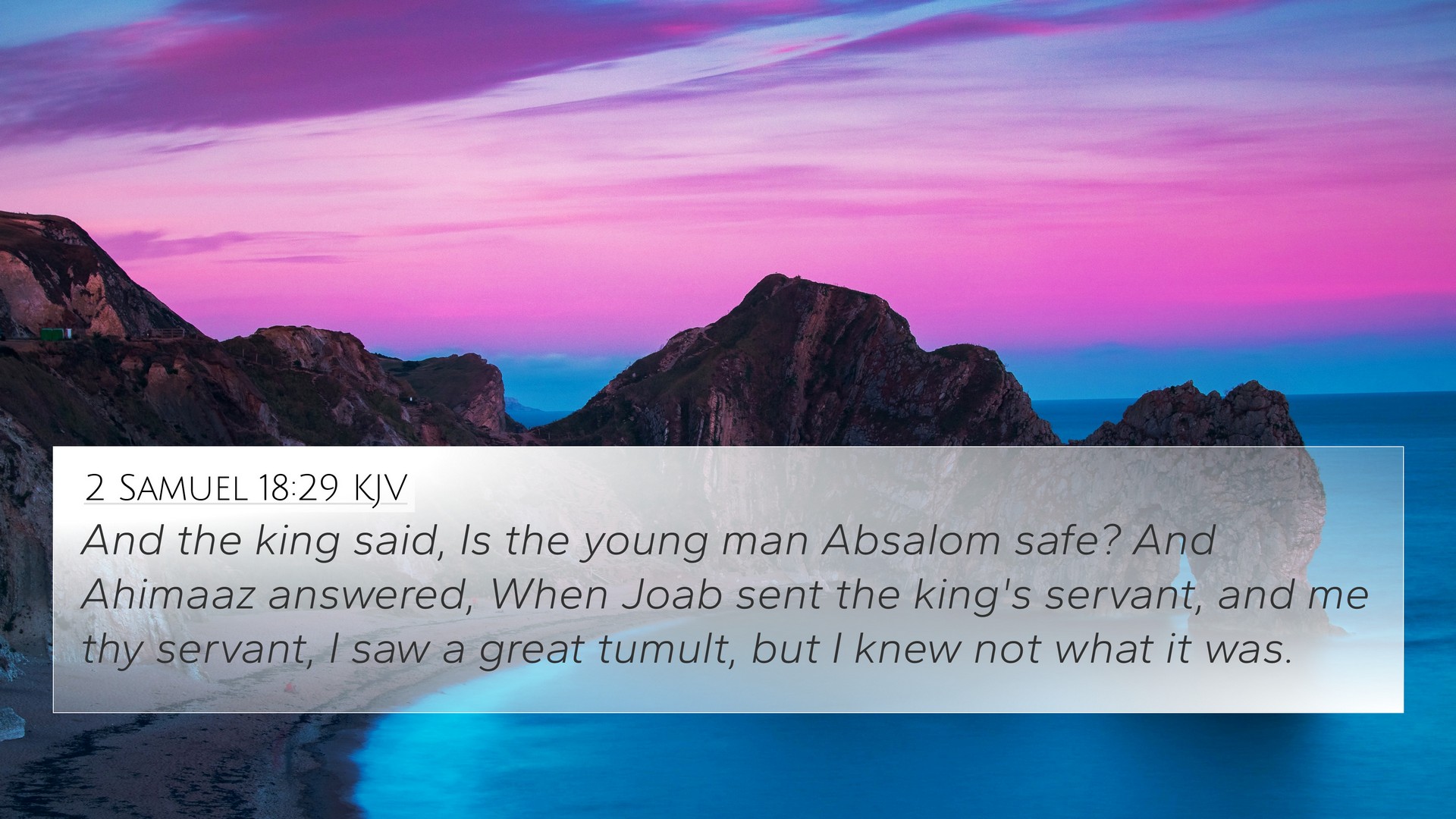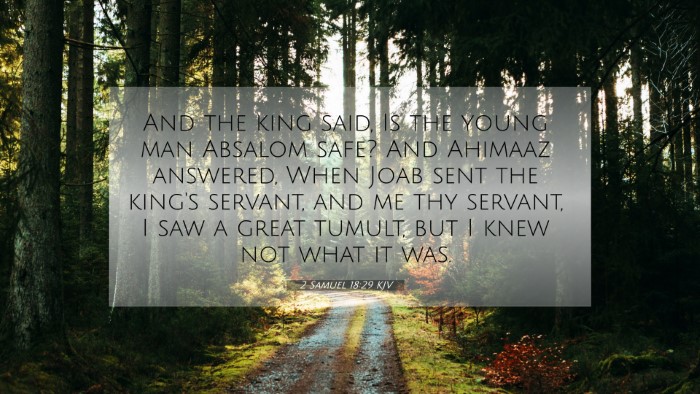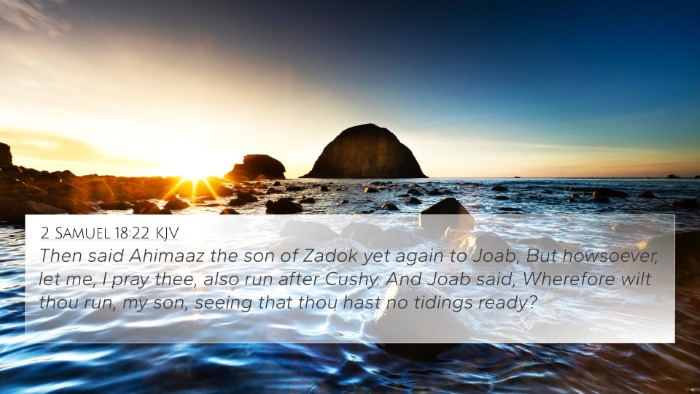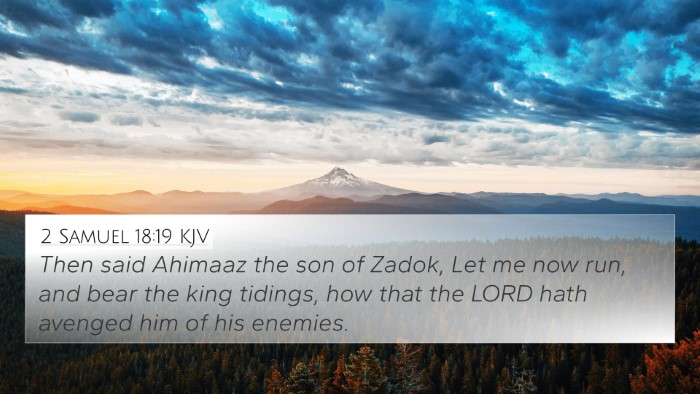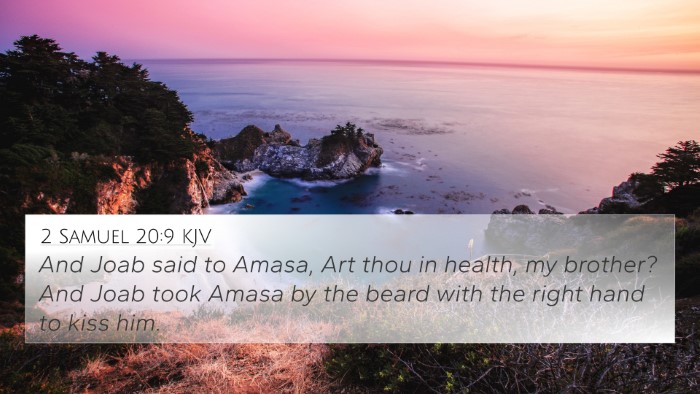Understanding 2 Samuel 18:29
Verse Reference: 2 Samuel 18:29
Verse Text: "And the king said, Is the young man Absalom safe? And Ahimelech answered, When Joab sent the king's servant, and me thy servant, I saw a great tumult, but I knew not what it was."
Summary of Meaning
This verse captures a pivotal moment following the intense battle between David’s forces and those loyal to Absalom, David’s son. The king’s immediate concern reflects a father’s love and care, as well as his anxiety over Absalom’s fate.
Commentary Insights
-
Matthew Henry:
Henry emphasizes King David’s desperate inquiry about his son Absalom, showing his deep emotional turmoil. David, a king but also a father, is portrayed with a duality of authority and vulnerability. This moment reflects the weight of parental responsibility, set against the backdrop of political strife and personal grief.
-
Albert Barnes:
Barnes focuses on the implications of the tumult that Ahimelech observed. He indicates that the focus on Absalom's safety denotes the inner conflict in David’s heart. Even amidst victory, the loss of his son casts a shadow over the triumph, indicating the profound personal costs of war and rebellion.
-
Adam Clarke:
Clarke analyzes the terms used by Ahimelech, focusing on his uncertainty about the situation. He suggests that the tumult he mentions points to the chaos accompanying conflicts and the difficulty in discerning the outcomes of battles. Clarke also notes implications for prophetic visions and the unpredictability of human affairs in light of God’s sovereignty.
Biblical Themes and Connections
The verse intricately ties into broader Biblical themes, reflecting the relationship between a parent and a child, the nature of leadership, and the consequences of rebellion. Some connected verses include:
- 2 Samuel 15:12: Absalom’s rebellion begins, highlighting the familial strife.
- 2 Samuel 17:23: Ahithophel’s suicide serves as a diabolical twist related to Absalom’s decisions.
- Psalm 3:1-3: David expresses his distress over Absalom’s uprising in this poignant prayer.
- Lamentations 3:33: Reflections on God’s mercy amid suffering relate to David's turmoil.
- Matthew 10:36: "A man's foes shall be they of his own household," connecting to David’s family conflict.
- Luke 11:17: Highlights the division within families, echoing David's clash with Absalom.
- Galatians 6:7: Underlines the principle of reaping what one sows, prevalent in the narrative of Absalom’s rebellion.
Inter-Biblical Dialogue
This verse evokes thematic dialogue between both the Old and New Testaments. The crisis in David's household foreshadows future themes of familial and societal discord throughout scripture. The father-son dynamic seen here is echoed in the parable of the Prodigal Son (Luke 15:11-32) and in God the Father’s relationship with His wayward people.
Tools for Further Study
For those interested in deeper Biblical study, utilizing Bible concordances and Bible cross-reference guides can help trace connections between related verses. Understanding how to leverage cross-referencing Bible study methods can vastly enhance comprehension of scripture, such as identifying how David's turmoil connects with other Biblical narratives.
Conclusion
2 Samuel 18:29 is not merely a historical account; it resonates with timeless themes of love, loss, and the heavy burdens of leadership. It serves as a reminder of the struggles faced both by individuals and families within scripture, encouraging readers to explore their depths through careful cross-referencing and thematic analysis.
